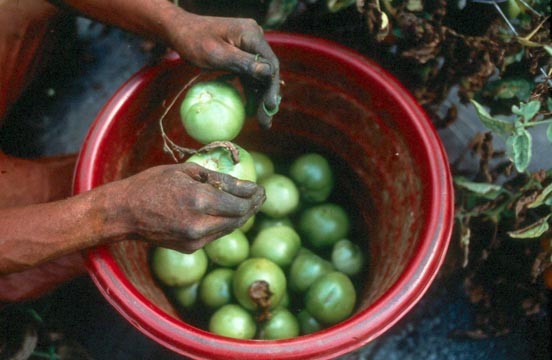Food sovereignty best addresses public interests
For the past two decades, small producers and family farmers have been shaping the concept of food sovereignty, based in the belief that all people deserve a say in how their food is produced, as well as the right to grow and produce it themselves through ecologically sound and sustainable methods.
The following article appeared in the September-October 2013 issue of NewsNotes.
October 16 is World Food Day, a day dedicated to education about world hunger and possible solutions. For the past two decades, small producers and family farmers have been shaping the concept of food sovereignty, based in the belief that all people deserve a say in how their food is produced, as well as the right to grow and produce it themselves through ecologically sound and sustainable methods. This notion, developed by the international peasant group Via Campesina, will gain traction this World Food Day as October 16 is the date chosen to present the Food Sovereignty Prize (awarded by the U.S. Food Sovereignty Alliance) and to launch the Right to Food and Nutrition Watch Report 2013 in various cities around the world.
This year’s Food Sovereignty Prize will go to the Haitian Group of 4, Dessalines Brigade/Via Campesina. In 2007, Haiti’s largest peasant organizations – Heads Together Small Farmers of Haiti (Tet Kole), the Peasant Movement of Papaye, the National Congress of Papaye Peasant Movements, and the Regional Coordination of Organizations of the South East Region – joined forces as the Group of 4 (G4), an alliance to promote good farming practices and advocate for peasant farmers.
The G4, representing over a quarter of a million Haitians, invited South American peasant leaders and agroecology experts to Haiti to work cooperatively to save Creole seeds and support peasant agriculture. Together, the G4 and the Dessalines Brigade, as it became known – named for 19th-century Haitian independence leader Jean Jacques Dessalines and supported by Via Campesina – have collaborated to rebuild Haiti’s environment, promote wealth and end poverty. The partnership also provided immediate and ongoing support to the victims of the 2010 earthquake, and the G4 made global headlines when they rejected a donation of hybrid seeds from Monsanto.
The Food Sovereignty Prize is a project of the U.S. Food Sovereignty Alliance, whose members include the Maryknoll Office for Global Concerns, Food First, Grassroots International, Why Hunger, and many more. Now in its fifth year, the prize was created as a way to provide a counter-balance to the well-publicized World Food Prize, which in recent years has been awarded to large industrial agricultural projects which exclude peasant farmers both in their engineering and implementation. The Food Sovereignty Prize is meant to draw attention to the kind of alternatives that people in peasant communities around the world are creating to address the very specific challenges they face. (See related NewsNotes story.)
The 2013 Food Sovereignty Prize awardees demonstrate the kind of alternative thinking that is highlighted in the 2013 Food and Nutrition Watch Report, Alternatives and resistance to policies that generate hunger. The report also critically analyzes many of the new programs developed through public private partnerships between governments and some of the largest, most concentrated agri-business corporations in the world. It reveals the ways in which people and communities most impacted by both the programs themselves and the policy changes necessary to clear the way for them are completely left out of their project design and implementation.
Recognizing that nearing a billion people around the world are struggling with chronic hunger, and that a hungry world can never be a secure and just world, Rep. Betty McCollum (D-MN) introduced the Global Food Security Act of 2013 (HR 2822) in early August. The bill directs the president to develop a comprehensive, multi-agency strategy focused on improving nutrition; strengthens agricultural development; ensures smallholder farmers access to inputs and training; and updates the Foreign Assistance Act of 1961 to include a renewed focus on women, nutrition and smallholder farmers. This is a valiant effort to get Congress more intimately involved in U.S. efforts to promote food security through its Feed the Future programs.
While the bill’s focus on women farmers and small holder farmers is indeed welcome, language around promoting agro-ecological methods was dropped just before the bill’s introduction. Smallholder farmers in less industrialized countries prefer these methods because they recognize that a “one-size-fits-all” approach is not possible. Unfortunately, even though there is broad recognition of smallholder methods, current Feed the Future policies and programs favor more industrialized and less labor intensive methods that are dependent on new inputs from non-local sources. Local farmers far prefer agro-ecological and biologically diverse systems to address problems related to climate change, resource scarcity and to avoid fossil fuel dependency. Although their work is seen as labor intensive, smallholder farmers around the less industrialized world see themselves as champions of their own food sovereignty – their work offers them a vehicle for escaping hunger and poverty.
Read about the prize at foodsovereigntyprize.org. Read the Watch Report at http://www.rtfn-watch.org. Learn more about the Global Food Security Act at thomas.loc.gov/cgi-bin/query/z?c113:H.R.2822.

